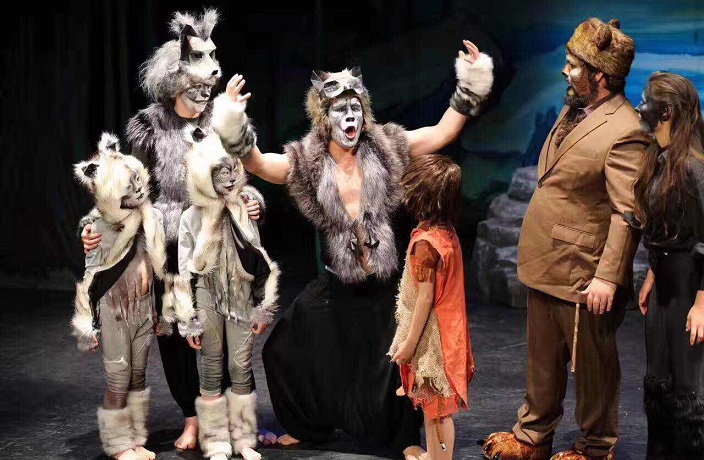Being chased by Shere Khan, the tiger in the Indian jungle, a human boy found protection and home in a family of wolves. Growing up under the tutorship of Baloo the bear and Bagheera the black panther, the boy turned out to be a true jungle animal, familiarized with the law of the Jungle. Yet the tiger never gave up preying on him. The boy had to resort to his human wisdom to settle this problem with fire and bring peace back to the jungle. However, this also made him realize that he didn’t really belong to the jungle any more. Though still pretty tangled inside, the boy decided to go back to the human village.
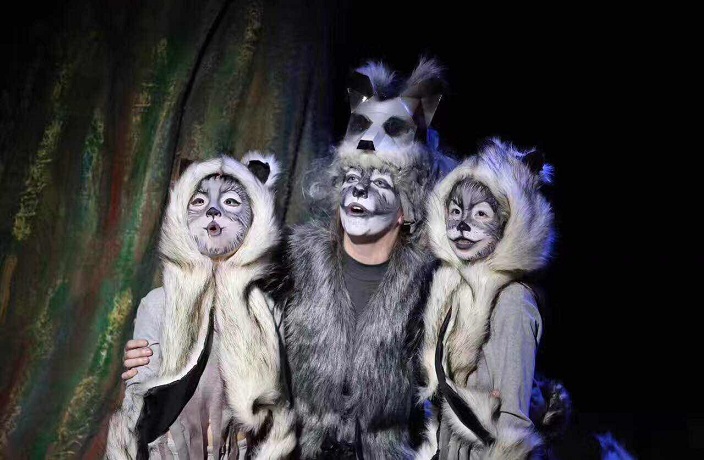
This is the storyline of The Jungle Book produced by Early Birds, a local language education institution. Though the adaptation is based upon a small part of Rudyard Kipling’s stories about Mowgli - a word coined by Kipling meaning “frog” in his so-called “jungle language”, with which the wolf family named the boy to describe his lack of fur - it was perfectly tailored for the young audience. The 226 seats of Ke Center for the Contemporary Arts were fully occupied in each of the 6 shows.
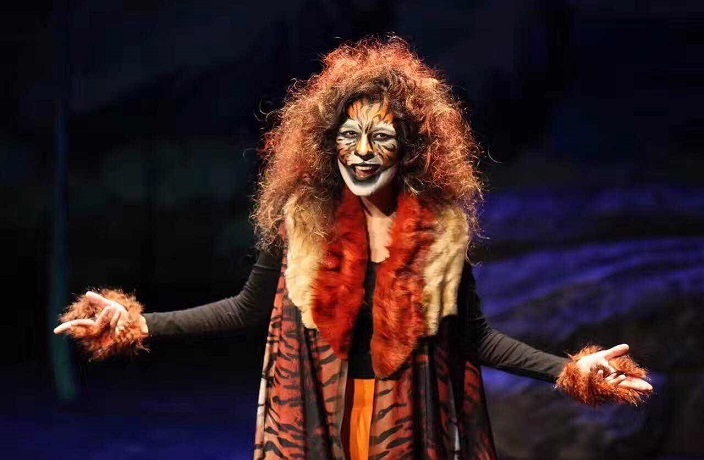
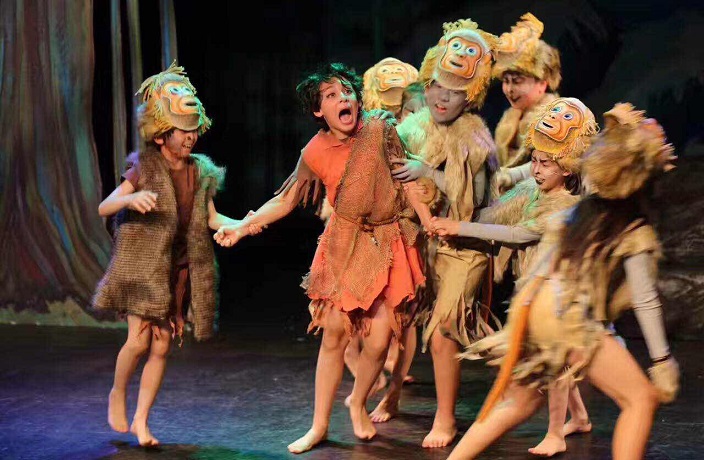
While the 1967 Disney animation dedicated too much attention on the funny and adorable part, and seems a bit naive even for kids in primary school, the 2016 live-action film is too spooky in parts and can easily scare an adult. The family show by Early Birds turned out to be quite a loyal adaptation to Kipling’s writings. It follows the storyline of “Mowgli’s Brothers”, the first short story in The Jungle Book, with anecdotes from the following one, “Kaa’s Hunting”, so as to include more animals and make it more amusing for the kids.
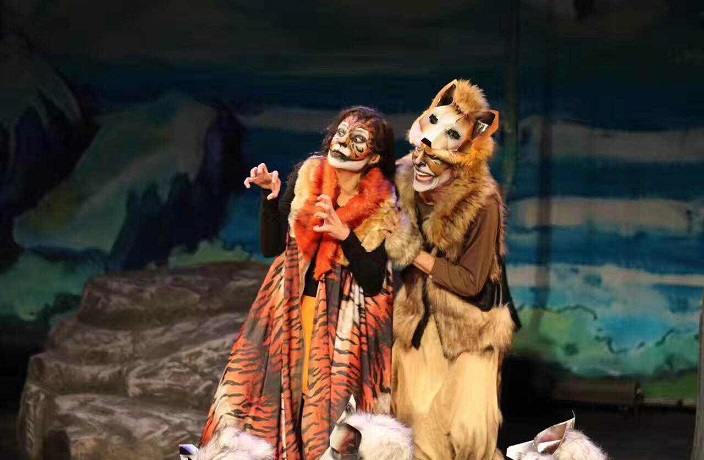
One of the most exciting changes is making Bagheera a female. The black panther has always been like a mother figure in the original stories, teaching the boy about emotions and tears, bidding him to leave against its own will; and in this production we get to meet the panther presented by an actress with really convincing performance.
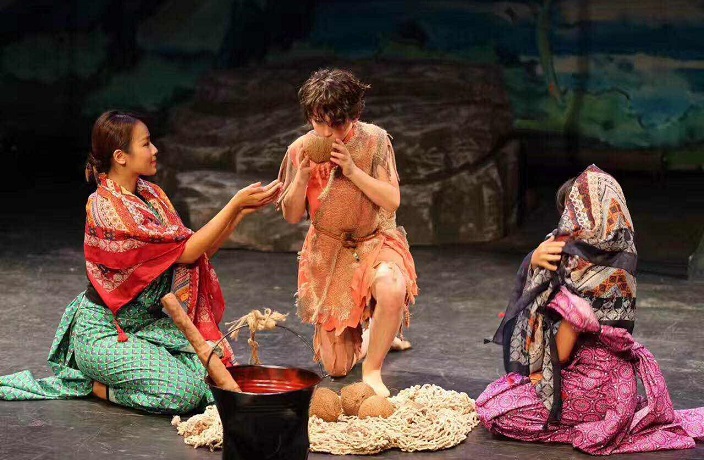
Except for the Wolf parents, Baloo, Bagherra, Shere Khan, his wingman Tabaqui the jackal and a woman from the village, all the other characters are presented by children 7-12 years old from local bilingual schools and international schools. Arran Hawkins, founder of Shanghai-based expat theatre company, Theatre Anon, and director of this adaptation, shared with us his challenging yet inspiring experience working with the kids.
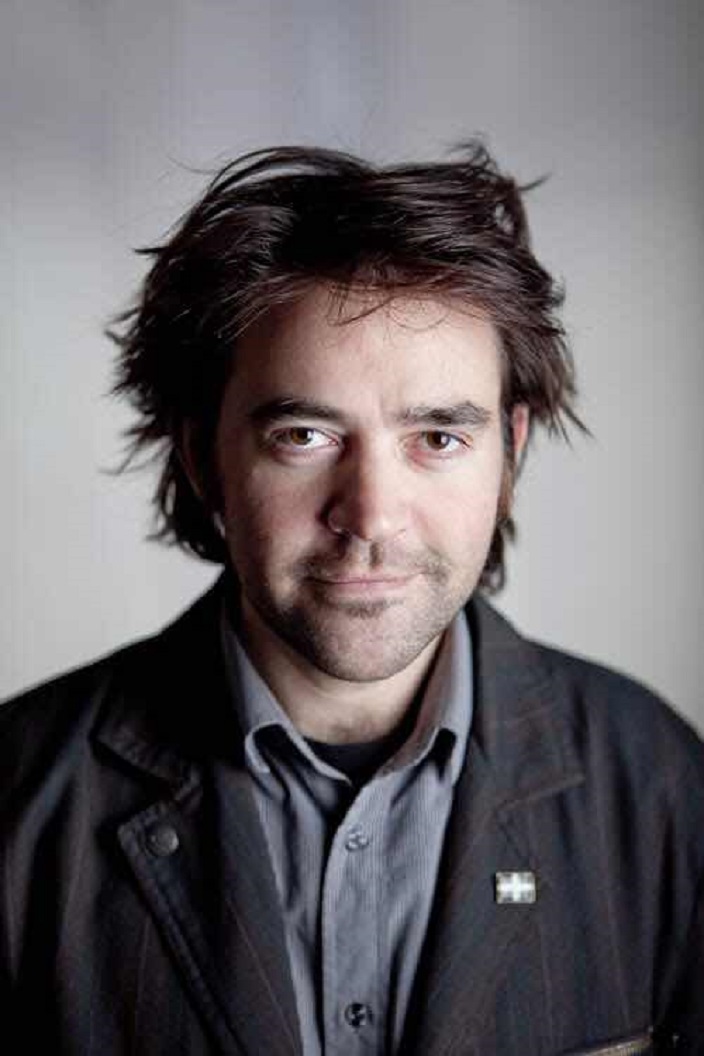
Urban Family: Is this the first family production you directed?
Arran: No. Theatre Anon, which is the theatre company I founded with some friends in 2013, has produced two family shows: The Snow Queen and OZ. And myself, as a director, have worked on several school shows back in the UK.
Urban Family: Does it make a professional like you feel bad that you have to simplify things for the young audience, and may not have enough time to build up the emotional powers during this relatively short show?
Arran: Not at all. There is no difference, as I see it, in creating a show for kids, a show for families or a show for adults. As a professional, the work is the same either way - You are creating something for an audience to enjoy. Creating theatre never makes me feel bad. It’s rewarding no matter who the show is targeting.
Urban Family: Was it challenging for you to work with so many kids?
Arran: I’ve worked with a larger amount of kids before, as I used to do school shows back in the UK, which would involve up to 30 or 40 kids. And working with kids is always a challenge. With Jungle Book, I was very selective during the audition process to make sure we found the best kids for the show, and those that really wanted to be involved. And there weren’t 30 or 40, just 12. It was a challenge, but the kids worked hard and took my direction and gave some great performances. I’m very proud of them all.
Urban Family: Did Early Birds just invite you alone as the director, or did Theatre Anon collaborate with them through the whole production? Are you looking forward to being part of more family shows or opportunities to work with schools?
Arran: EB invited me to direct. Theatre Anon and Early Birds have worked together before, on a co-production of OZ in 2015. But this time, for Jungle Book, I was just the hired-in director. It’s a challenge for them, as they are only really branching into theatre now, as new producers. They’re learning, but this project was a lot smoother than the last, and I have no doubt they will keep improving. Practice makes perfect.
I’m always open to new projects, as long as they excite me in some way, theatrically and artistically. Theatre Anon will aim towards another family show later this year, or early next.
Urban Family: What’s your personal ideas about Kipling’s original story of the boy Mowgli?
Arran: I hate to say it, but I’ve never actually read the book. I’ve seen the Disney animation and know the story. I came to the script, which was bought in from the USA, with a focus of just working with the material given. Had I been adapting the show myself, it would have been a different story, but I made a conscious decision not to read the original material, so I wouldn’t be disappointed with anything the working script may have left out.
The story for me is about mankind being a destructive force and the animals co-exist in the jungle together, in balance, if not always in harmony, with each other and nature. They fear man, and by association, fire, which they name 'The Red Flower'. But there is hope, and hope comes in the form of Mowgli, the man cub, who has the potential to educate his fellow man about the benefits of protecting the jungle and nature itself, which is as relevant now as it was in Kipling's day, if not more so.
Urban Family: Tell us something more about your painting career please! Do you find this painter part of you and the stage artist part of you inspiring each other?
Arran: Sure. They are both ways for me to express myself, artistically. Although the theatre has always been my main passion, and the one I am most experienced in. Painting is something I go through in stages. After I produced Snow Queen in December 2015, then Dangerous Liaisons, then went back to the UK to act in a show, and then take Snow Queen to the Edinburgh Fringe, I was exhausted, theatrically. So for the last part of 2016, I spent all my time painting. I now have a new collection which I hope to exhibit later in the year.
Urban Family: You’ve been in Shanghai for almost a decade right? What first brought you here? Has your opinion of this city changed much? Do you see yourself staying for another ten years?
Arran: I arrived in 2008 to teach art in an art center in Pudong. That lasted 10 months. The place was terribly managed, and treated its staff with utter disrespect. I went home after that, for about 5 months, but Shanghai wasn’t done with me, and I missed it, so I returned in late 2009, and got involved in the Shanghai theatre scene straight away. Since then I have developed a love/hate relationship with this city. I love getting out of it, but I do miss it when I’m away. But another ten years here? I don’t think so.

